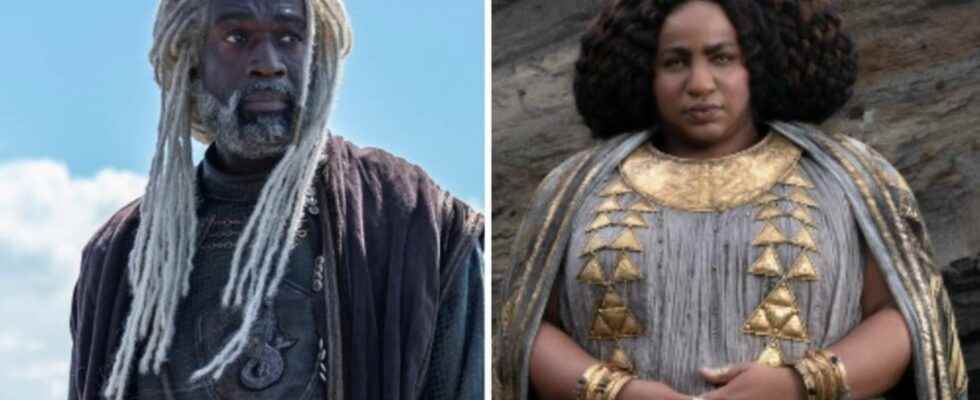“The Rings of Power” & “House of the Dragon”
Why shouldn’t fantasy be diverse?
Steve Toussaint plays the influential “sea serpent” Corlys Velaryon in “House of the Dragon”, Sophia Nomvete embodies the dwarf Disa in “The Rings of Power”.
© Amazon Prime Video / 2022 Home Box Office, Inc. All rights reserved HBO® and related channels and service marks are the property of Home Box Office, Inc.
The series “The Rings of Power” and “House of the Dragon” have been criticized by some people for their diverse cast. Why is that?
The imagination knows no bounds. But in a film and series genre that was literally named after her, this does not seem to apply from the point of view of many viewers. With “The Lord of the Rings: The Rings of Power” and the “Game of Thrones” offshoot “House of the Dragon”, two epochal fantasy series have come out within a very short time.
Both productions show monumental battles, scheming power games and (visually) powerful mythical creatures such as dragons and trolls. What they also have in common: a part of the audience that expresses toxic criticism of gender roles and the diversity of the cast. Statements are made that have never – not to mention the 21st century – lost anything in our society. But why isn’t fantasy supposed to be diverse for many fans of the genre?
Hate and its consequences
The black “House of the Dragon” actor Steve Toussaint (57) could not have formulated the paradoxical features of this criticism more aptly. He plays the influential Corlys “The Sea Serpent” Velaryon on the series. According to Toussaint, there are people who are “happy with a flying kite”. “You’re happy with white hair and violet eyes, but a rich black man? That’s unacceptable,” the actor told Men’s Health. In other words: In a fictional medieval world, in which there are dragons, the undead, magic – and snow-white, straight teeth – there are wealthy black people who are simply too unrealistic.
The cast of the Amazon Prime series “The Rings of Power” also had to leave due to numerous “racist hostilities”. clarify something via Twitter post: Together we stand “in absolute solidarity against merciless racism, threats, harassment and insults” directed against BIPoC (Black, Indigenous and People of Color).
Because of the commitment of non-white actors for the roles of elves and dwarves, the series was targeted by opponents of an alleged “Wokeness dictatorship”. The fact that with Morfydd Clarks (33) Galadriel a woman embodies the energetic main character, also pissed off some. Including the richest man in the world, Elon Musk (51), who poisoned on Twitter against the Amazon series – and probably primarily against the main competitor Jeff Bezos (58).
You have to let this melt on your orc tongue: There is a story about camaraderie, togetherness and love. A story that unites the races of Middle-earth to stand against the forces of evil. And then is it the skin color and gender of the characters that some supposed Tolkien fans go on the barricades about?
“That’s never happened before!”
The main argument of this loud group is obvious: Even in the original “The Lord of the Rings” book series by JRR Tolkien (1892-1973), the companions are human, dwarf, elf and hobbit – but also white and male.
Yes, the Briton Tolkien was a vocal opponent of the National Socialist “racial theory”. But he too was a child of his time and would probably design some figure drawings differently today. Anyone who understands Tolkien fandom, that everything has to be the way it was when the book was written, is also voluntarily going back to the intellectual, moral and sociological state of the 1950s. And that of a man born in 1892.
With “House of the Dragon” the situation is different. The series is based on the 2018 book “Fire and Blood” by George RR Martin (73). Like the novel it was based on, the Sky/Wow series shows unbelievable atrocities on and off the battlefield as well as sexual violence against women in the eternal intrigues of the individual parties. But does the “fun” stop with black people in positions of power, who have only appeared as minor characters up to now?
Anyone who complains about the lack of loyalty to the book template in “House of the Dragon” should also do so in “Game of Thrones” and its counterpart “A Song of Ice and Fire”. In the series, many of the characters were aged several years compared to the original – otherwise some already unbearable scenes would have been even harder to digest. So sometimes it’s not bad at all if one or the other artistic freedom creeps into an adaptation.
A woman is in charge. A woman is in charge!?
It is sadly ironic that ‘The Rings of Power’ actress Morfydd Clark has to deal with similar difficulties in reality as the character Rhaenyra Targaryen (Milly Alcock, 22) in the fiction of ‘House of the Dragon’. One is told by the assembled male world of Westeros and the surrounding area that she could never ascend the Iron Throne as a woman. The other is summarily denied the ability to function as the main character of the most expensive series of all time – sometimes even before the first episode of the “Lord of the Rings” series has aired.
Of course, all this does not mean that justified criticism of character drawings or acting performance is forbidden. However, at least for some viewers, sometimes more, sometimes less, latent convictions that have no place anywhere seem to flow into this criticism. Neither in Middle-earth. Still in Westeros. And certainly not in our world.
